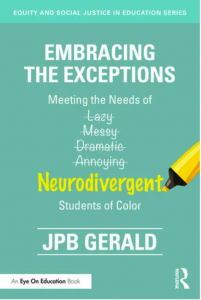JPB Gerald is a Black neurodivergent adult educator who received his doctorate from CUNY – Hunter College in Instructional Leadership. He works in education management and curriculum development at a nonprofit and is an adjunct professor in his spare time. His scholarship focuses on language education, racism, and neurodivergence and he lives with his wife, young son (with another on the way), and dog in Yonkers, New York (on unceded Munsee Lenape/Canarsie territory). Here, I ask him about his new book, Embracing the Exceptions: Meeting the Needs of Neurodivergent Students of Color, which is out now from Routlege. You can find out more about JPB Gerald at his website. And you can follow him on Twitter @JPBGerald
AMW: How are neurodivergent students of color often overlooked? And how does this impact their classroom experiences?
JPBG: Generally speaking, the “symptoms” of neurodivergence are visible movement, issues with eye contact, and other quite noticeable things. But, as with most stereotypes, this is based on a “norm,” which in this case is white boys. If you’re anything other than that, it’s quite common for these behaviors to be socialized “out” of us, whether or not we would naturally make these choices. Accordingly, we often internalize our reactions, which means that our neurodivergence often manifests in inward shame, or emotional reactions that are borne of the former. Yet all that teachers can see is this end result, and we can often be tagged with “disruptive” (and other derogatory) labels. I think you can follow where this would lead for students’ trajectories, even before considering the school to prison pipeline.
AMW: How is your book unique?
JPBG: The fact of the matter is that there aren’t a lot of books about this; in fact there really aren’t any. I couldn’t base this book on all that much existing qualitative research neurodivergent students of color, because it wasn’t out there in great quantities. Ultimately, as someone who likes stories more than numbers, I thought it would be more impactful to really base the work in our lived experience. So, the book is mostly just our stories, what we went through, what we felt, what made us struggle but also succeed. Reading the book will allow people to hear from us directly in a way that hasn’t happened before.
AMW: How can we help teachers reach all students?
Many neurodivergent students of color are not diagnosed. So my advice is broadly for teachers who do not have a mandated roadmap such as an IEP (individual education plan), not that all IEPs promote equity. Ultimately, as hard as it can be to do (and I fully understand having been an educator for 16 years), we need to release control to gain control. We have to let go of assessing based on methods if the student is finding their way to the ultimate destination. We need not to restrict unless absolutely necessary. And we need to praise and validate for students’ attempt to communicate and reach our goals. Too much of education is centered on carrots and sticks with an emphasis on the sticks. We need to accept our students the way they are and help them find their way within their actual worlds and not just the ones we want them to be in.
Alicia M. Walker is Associate Professor of Sociology at Missouri State University and the author of two previous books on infidelity. She is the current editor of the Council of Contemporary Families blog and serves as Senior Fellow with CCF. Learn more about her on her website. Follow her on Twitter at @AliciaMWalker1 and Instagram @aliciamwalkerphd



Comments